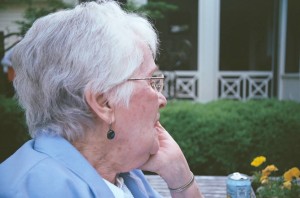Elderly depression causes many issues for older adults. The chance for depression increases as we age. Aging can deliver physical, financial, spiritual and mental challenges some of which may be difficult to deal with. Many life changes such as health problems or fixed income issues can get seniors down once in a while, but when a senior doesn’t enjoy his usual activities or the “blues” continue on for a long period of time, he may require help for clinical depression.
Elderly Depression Causes[/caption]Experiencing symptoms such as a lack of energy, confusion, grumpiness, irritability, mood changes and forgetfulness may seem like symptoms of Alzheimer’s disease, dementia and other diseases and conditions related to getting older, but all can be signs of depression. It is important to identify elderly depression causes because often times it goes undiagnosed due to the symptoms seeming like part of the “normal” aging process or a change such as in medication.
There are many causes and risk factors that contribute to depression in older adults and the elderly.

- Health problems such as dealing with physical changes, illness, disabilities, pain, limited mobility and even cognitive decline can be frustrating and lead to elderly depression.
- Seniors may have a weakened sense of purpose with changes such as retirement and health limitations. Having previously defined themselves through work and activity, a senior may feel a loss when faced with new restrictions.
- Loneliness plays a role in elderly depression. Relocation, social changes, living alone, death of friends or loved ones and other changes can lead to feelings of isolation.
- Fear of dying, reduction in finances and health issues are all understandable since the unknown can be scary. But fears and anxiety can lead to depression if not dealt with properly.
- Loss of friends, family and pets can create long-term depression unless you can find a way to cope with these losses.
- Depression can develop in seniors due to changes in the brain. According to the NIH, seniors can develop ischemia, a condition where blood flow is restricted creating hard blood vessels and preventing blood from reaching organs including the brain. This condition is known as vascular depression.
- Damage to body image, which can be through a recent surgery or just aging.
- Family history can increase a seniors’ risk for depression.
- Various medication also can increase chances of developing depression. Speak with your doctor if you experience depression after a change in medication.
Identifying elderly depression causes can help keep you or your loved one from suffering. If you are a senior or a caregiver, identify depression by checking for these depression causes and risk factors, finding ways to cope with each of them and seeking medical assistance if necessary.
Sources
1. NIH Senior Health on NIHseniorhealth.gov
2. Depression in Elderly on Webmd.com
3. American Psychological Association
image dharmapretzels

Loneliness can really affect someone's health. It may cause various health problems including dementia. That's why it's important to stay positive and laugh often. As they say, laughter is still the best medicine.